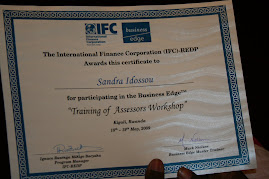
Service delivery in China: Lessons to learn part 1
By Sandra idossou
Sitting at this hour of the day at the Shanghai International airport in China, I am wondering how China managed to become the centre of the world looking at the numerous passengers who are travelling.
I am actually part of these passengers waiting to embark on my fourteen- hour flight back to Kigali.
For your information, The Shanghai Airport is one of the busiest airports in the world. It attracted 31.9 million passengers in 2009 and there are actually many other big international airports in China all as busy as this one.
I couldn’t imagine that two weeks after touring China, I will be filled with so many positive service experiences.The reason is simple. I came to China with many stereotypes. Yes, we all have many stereotypes on China.
Many of us only know China as the country with the biggest population in the world. Some also know China for its propaganda ideological and communist scenarios throughout Mao’s years or for its numerous restaurants in every part of the world.
As an African, I had always imagined China as the country of counterfeit looking at the thousand of cheap products and gadgets that have invaded our markets. In fact there is even a joke that everything cheap or non-durable must come from China.
But the fact is that all these are stereotypes. What most of us know comes from either Chinese movies full of Kung Fu or news brought to us by biased media houses in Europe or America or for few of us, from history classes in school.

Your columnist has encountered many accurate, absurd, sometimes very degrading and insulting à-priory of China. And that is the main reason why I agreed to the invitation of Mr Idossou to visit this unknown great country that is becoming one of the greatest in the world.
My journey to China started with my visit to the Embassy of China in Kigali. I was amazed by the level of service I received from this old-fashioned woman who must been working there before your columnist was probably born.
When I came out from the embassy, I just said customer service must be real in China or the country knows how to attract visitors.
As an avid passionate traveler, your columnist has been to different embassies to request for visas. And it is unfortunate to see the poor customer care we receive in most embassies.
We are more often treated as “beggars” going to fill our pockets with the gold lying on the streets of these countries. Just look for instance at the queues in the sun in front of most embassies in Kigali. This is a degrading non-human treatment to people that need to be looked into by whoever should be responsible for this.

Coming back to this first experience with the China Embassy in Kigali, I got mentally prepared to appreciate China. After bringing the necessary required documents, I got the visa within 5 days and was offered very informative documentations on China.

Dear readers, right from the Kenya Airways flight, to my transit in Nairobi, the first contact with the Chinese Immigration, the experiences with the taxi drivers, my visits to Guangzhou and to the Word Expo 2010 in Shanghai, your columnist had so many rich service experiences that she has decided to share them with you.

From all that I have heard before, China may have its fair share of customer service nightmares but many people unanimously agree on the fact that service delivery has positively improved because of certain measures that have been taken by both the government and the striving Chinese business community.
My goal in sharing with you my experiences in the next editions is only to give you an overview of service delivery in China. There are probably many things we can learn from China. Looking forward to taking you through my service experiences in China.
The author is a customer service consultant working in Rwanda.
sandra.idossou@sheiconsulting.com
www.sheiconsulting.com





































